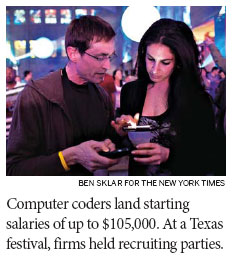Society
High-tech perks: iPads and cubicles for the dogs
Updated: 2011-04-17 07:47
By Claire Cain Miller and Jenna Wortham (New York Times)
 |
SAN FRANCISCO - Computer whiz kids have long been prize hires in Silicon Valley. But these days American tech companies are dreaming up new perks and incentives as the industry wages its fiercest war for talent in more than a decade.
Free meals, shuttle buses and stock options are de rigueur. The game maker Zynga dangles free haircuts and iPads to recruits, who are also told that they can bring their dogs to work.
Then there are salaries. Google is paying computer science majors just out of college $90,000 to $105,000, as much as $20,000 more than it was paying a few months ago. And there are the incentives: executives at a small start-up said it recently lost an intern when one of the biggest start-ups offered the candidate a 40 percent bump in stock options - but only if the candidate accepted the job before hanging up the phone.
"The atmosphere is brutally competitive," said Keith Rabois, chief operating officer at Square, a service to turn cellphones into credit card readers.
As the rest of the United States fights stubbornly high unemployment, the shortage of qualified engineers has grown acute in the last six months, tech executives and recruiters say, as the flow of personal or venture capital investing has picked up. In Silicon Valley in California, and other tech hubs like New York, Seattle and Austin, Texas, start-ups are sprouting by the dozen.
At the same time, nationwide unemployment among computer professionals remains higher than in many other white-collar fields - around 5 percent. The reason: few have the skills that tech companies look for, including knowledge of programming languages like PHP, Ruby and Python, which are still not taught in most colleges, said Cadir Lee, chief technology officer at Zynga.
Among the engineers who are in demand, there has been a psychological shift; many want to be the next Mark Zuckerberg, not work for him. Start-ups are acknowledging this by recruiting engineers with promises to help them to leave someday to start their own companies.
Redfin, an online real estate brokerage in Seattle, sets up meetings between recruits and venture capitalists. "It helps people stay but also helps them to go," said Glenn Kelman, Redfin's chief executive.
Recruiters have also expanded their searches. Since college degrees are not mandatory, recruiters are scouting computer coding contests and parties.
The push to impress recruits was fully evident at the South by Southwest festival in Austin, Texas, last month with the dozens of glitzy parties hosted by tech companies.
"The message being sent is that this is a cool, cool place to work," said Jay Adelson, chief executive of SimpleGeo, a start-up based in California and Colorado that makes tools for smartphones. "That matters when you are a young, hipster developer."
The New York Times
E-paper

Han me downs
Traditional 3,000-year-old clothes are making a comeback.
Reaching out
Fast growth fuels rise in super rich
Chinese tourists spend more
Specials

Big spenders
More mainland tourists are expected to spend money on overseas travel this year.

Rise in super rich
Report cites rising property prices, gdp as key drivers of increasing number of chinese millionaires.

Reaching out
Condom makers are stepping up their presence in smaller cities to boost sales
